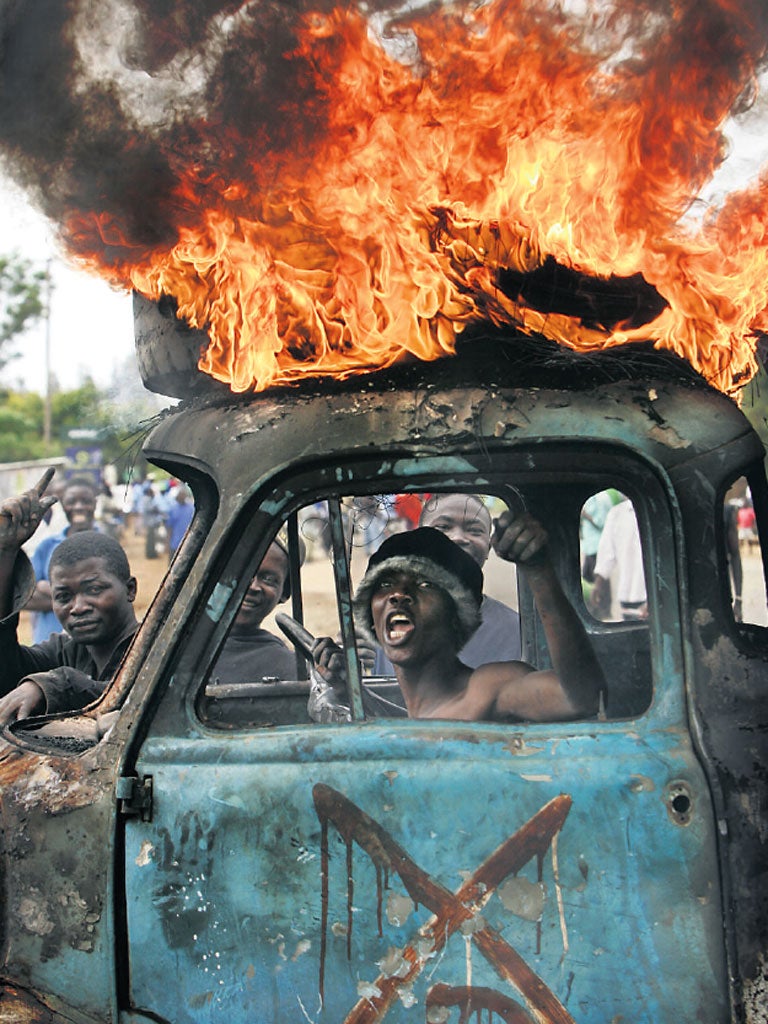Kenyan leaders to face trial for inciting ethnic war
Main presidential contenders called to The Hague over violence that tore nation apart

Your support helps us to tell the story
From reproductive rights to climate change to Big Tech, The Independent is on the ground when the story is developing. Whether it's investigating the financials of Elon Musk's pro-Trump PAC or producing our latest documentary, 'The A Word', which shines a light on the American women fighting for reproductive rights, we know how important it is to parse out the facts from the messaging.
At such a critical moment in US history, we need reporters on the ground. Your donation allows us to keep sending journalists to speak to both sides of the story.
The Independent is trusted by Americans across the entire political spectrum. And unlike many other quality news outlets, we choose not to lock Americans out of our reporting and analysis with paywalls. We believe quality journalism should be available to everyone, paid for by those who can afford it.
Your support makes all the difference.Three of Kenya’s most powerful men will face trial at the International Criminal Court for their alleged involvement in the violence that engulfed the country in the wake of a disputed election four years ago.
From the slums of Nairobi to the leafy residences of the political elite and the makeshift camps where many of those displaced by the post-election fighting remain, Kenyans stopped to listen to a short statement from The Hague, in the Netherlands. They were told that two of their leading presidential contenders, Uhuru Kenyatta and William Ruto, as well as Kenya's top civil servant, Francis Muthaura, would face charges for crimes against humanity. A fourth man, radio presenter Joshua Arap Sang, will also be in the dock.
Two of the accused, who thanks to the celebrity of the ICC chief prosecutor Luis Moreno Ocampo have come to be known as the "Ocampo 6", were told they were no longer suspects. The judges found there was insufficient evidence to proceed against the relative minnows in the case, Industrial Minister Henry Kiprono Kosgey and the former police chief Muhammed Hussein Ali.
The violent aftermath of the last election in East Africa's leading economy will now play an important part in the next vote, expected this year. Mr Kenyatta and Mr Ruto, who have tried to position themselves as the champions of their respective ethnic groups, must now decide whether to stand for the presidency. Despite the ruling by the ICC, there is no firm date about when the trial might take place.
None of the four men charged has been arrested but they were warned by the court that "their continued liberty is subject to their non-engagement in incitement of violence or hate speech".
The findings mean some of Kenya's most influential politicians have been charged as indirect co-perpetrators of "a large number of killings, displacement of thousands of people, rape, severe physical injuries and mental suffering".
Ethnic divisions in Kenya were exploited at the cost of more than 1,500 lives during weeks of massacres at the end of 2007 and beginning of 2008.
There was relief among human rights campaigners in Kenya, many of whom have been targeted by supporters of the accused. "This decision demonstrated that no one in Kenya is immune to the law," said Hassan Omar Hassan, chairman of the Kenyan National Commission for Human Rights (KNCHR). "If it had gone the other way it would have emboldened the perpetrators and been a fundamental setback for ending impunity." The KNCHR issued a report on the post-election mayhem, naming those it considered responsible. It was sued unsuccessfully by those it named as ringleaders, including Mr Ruto and Mr Kenyatta.
Meanwhile, the ICC has responded to criticism of its focus on African cases by appointing an African – Gambia's Fatou Bensouda – as successor to the outgoing Argentinean lawyer Mr Moreno-Ocampo.
The majority of Kenyans have ignored attempts to paint the court as anti-African and supported its efforts to bring to account those most culpable for the post-election violence.
"This was very important for the ICC due to the high expectation created in Kenya," said James Gondi, head of the Kenya office of the International Centre for Transitional Justice. "Kenyans are looking to the court to provide justice."
The trial will now go ahead during campaigning for the election, expected later this year, creating concern among some analysts that it will increase the potential for violence. "It could mean that the accused try to mobilise violence around the elections but it could also mean that they become politically irrelevant as the evidence is revealed against them," said Mr Gondi.
On trial: crimes against humanity
Francis Muthaura
Often described as President Mwai Kibaki's right-hand man, the head of Kenya's civil service is highly influential. His prosecution has caused panic in the political elite.
Uhuru Kenyatta
Kenya's Finance Minister is the scion of the country's founding family and one of its richest men. Has presidential ambitions and sees himself as the political leader of the Kikuyu ethnic group.
William Ruto
The suspended Education Minister has faced serious corruption charges at home which he has brazened out. Still seen as rival to Kenyatta and PM Raila Odinga for the presidency.
Join our commenting forum
Join thought-provoking conversations, follow other Independent readers and see their replies
Comments